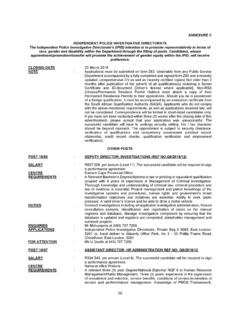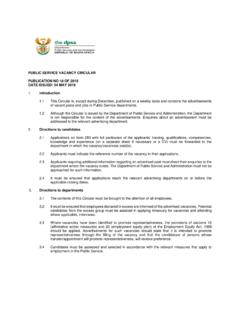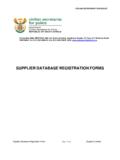Transcription of Statement of Prosecution Policy & Guidelines
1 Director of Public Prosecutions South Australia Statement of Prosecution Policy & Guidelines Director of Public Prosecutions South Australia Statement of Prosecution Policy & Guidelines October 2014. TABLE OF CONTENTS. Introduction 1. The Office of the Director of Public Prosecutions 2. The Director of Public Prosecutions 3. The Role of the Prosecutor 4. The Decision to Prosecute 5. GUIDELINE 1: Choice of Charges 9. GUIDELINE 2: Charge Bargaining 10. GUIDELINE 3: Giving Advice to Investigators 11. GUIDELINE 4: Ex Officio Information 13. GUIDELINE 5: Declining to Proceed after Committal 14. GUIDELINE 6: Immunity from Prosecution 15. GUIDELINE 7: Unrepresented Accused 17. GUIDELINE 8: The Court Process 18. GUIDELINE 9: Disclosure 20. GUIDELINE 10: Media Contact 23. GUIDELINE 11: Witnesses 24. GUIDELINE 12: Victims of Crime 25. GUIDELINE 13: Victim Impact Statements 26. GUIDELINE 14: Prosecution Appeals 27.
2 Conclusion 29. ANNEXURE A: Director of Public Prosecutions Act 1991 30. ANNEXURE B: Victims of Crime Act 2001 36. INTRODUCTION. The Office of the Director of Public Prosecutions was established in 1992 to provide an effective, fair and independent criminal Prosecution service for the people of South Australia. Since that time all major criminal prosecutions have been conducted by the Office in Adelaide and in the country areas of Port Augusta and Mount Gambier. The Office is committed to the highest ethical and professional standards and strives to achieve the most effective and appropriate criminal prosecutions. It is integral to the process that all members of the Office adopt and implement the same set of values and standards when evaluating charges and conducting prosecutions. The Prosecution Policy was first issued upon the establishment of the Office in 1992 and since that time has been under review.
3 Given recent amendments to legislation and the fact that the Policy was last published in 1993, I felt it appropriate to update and republish the Policy and Guidelines . The Policy is available to all interested members of the public, legal profession and the police and can be accessed via the DPP website ( ). This Policy and the annexed Guidelines are those governing the decision to prosecute criminal offences in South Australia. They form part of the uniform Prosecution Policy adopted by the Directors of Public Prosecutions of all States and the Commonwealth of Australia in 1990. Adam Kimber SC. Director of Public Prosecutions [Back to Contents] 1. THE OFFICE OF THE DIRECTOR OF PUBLIC. PROSECUTIONS. The Office of the Director of Public Prosecutions (the Office) is divided into a number of smaller units that conduct the functions of solicitors and prosecutors with a close working relationship.
4 In this document the legal staff within the Office and members of the private profession briefed to appear on behalf of the Director are referred to as prosecutors. The Office's first contact with most criminal matters is through the State Committal and Disclosure Section (SCADS) of the South Australia Police once charges for major indictable offences have been laid and a date for the provision of declarations has been set by the Court. The Office then assumes conduct of these matters until their final resolution. The Office also conducts summary trials in complex or sensitive matters and appeals from the Magistrates Court on indictable offences. This document provides a framework for those conducting prosecutions on behalf of the State. In addition to the legal staff the Office has a Witness Assistance Service (WAS) that provides assistance to witnesses involved in major indictable proceedings and referral to other agencies if necessary.
5 All staff within the Office work on the instructions of the Director who has been appointed pursuant to the Director of Public Prosecutions Act, 1991 (the Act) (Annexure A). 2 [Back to Contents]. THE DIRECTOR OF PUBLIC PROSECUTIONS. The obligations of the Director of Public Prosecutions are no different from those imposed on every prosecutor or prosecuting authority in the common law system. The primary obligation on a prosecutor is one of fairness. Fairness must dictate eventually the discharge of all of a prosecutor's functions. But the question must be asked as to whom these obligations are owed. Obviously a prosecutor must be fair to an accused but that cannot be the sole consideration. There are other parties with legitimate interests who are also entitled to expect a prosecutor to act in a particular way. Sometimes these interests will conflict with those of the accused.
6 A prosecutor has obligations to varying degrees to the following: the court (judge and jury). the community the accused victims witnesses defence counsel A prosecutor must play his or her part in securing a fair trial for persons accused of criminal offences. A fair trial is one that results in justice being done conviction of the guilty as well as acquittal of the innocent. A fair trial may be described also as one where all relevant credible evidence is presented, tested and adjudicated upon according to law. The obligations of the Prosecution to the various parties flow from those concepts. [Back to Contents] 3. THE ROLE OF THE PROSECUTOR. In order to understand the obligations of a prosecutor in any given situation or at any particular stage of the trial process, it is necessary to define the role of the prosecutor. The exercise has been attempted on numerous occasions by various commentators.
7 The role is usually expressed in terms such as a minister of justice or an officer of the court . It may be more easily understood in terms of what it is not. It is not about winning or losing where convictions are wins and acquittals are losses. A conviction obtained on insufficient or doubtful evidence should be regarded as a loss just as much as a failure to obtain a conviction on a strong credible Prosecution case. Again, it is a matter of striking a balance. Some quotations from commentators may assist in defining the role of the prosecutor: (The role of the prosecutor) is not to obtain a conviction: it is to lay before a jury what the Crown considers to be credible evidence relevant to what is alleged to be a crime. Counsel have a duty to see that all available legal proof of the facts is presented; it should be done firmly and pressed to its legitimate strength, but it must also be done fairly.
8 The role of prosecutor excludes any notion of winning or losing: his function is a matter of public duty than which in civil life there can be none charged with greater personal responsibility. It is to be efficiently performed with an ingrained sense of the dignity, the seriousness and the justness of judicial proceedings. (Per Rand J in Boucher v R (1954) 110. CCC 263 at 270). Finally there is or has been a tendency for Counsel for the Prosecution not to prosecute firmly enough. The last half century has seen a welcome transition in the role of a prosecuting counsel from a persecuting advocate into a minister of justice, but in some places the pendulum has swung so far and the ministry has moved so close to the opposition that the Prosecution 's case is not adequately presented and Counsel, frightened of being accused of excessive fervour tend to do little except talk of reasonable doubt and leave the final speech on the facts to the Judge.
9 The result of the deficiency is that the duty of seeing that the Prosecution 's case is effectively put to the jury is sometimes transferred to the Judge and thus the balance of the trial is upset. (Lord Devlin, Trial by Jury ). But in the end it may come back to the words of Christmas Humphreys QC: It is the duty of prosecuting counsel to prosecute, and he need not rise to his feet and apologise for so doing. It is not unfair to prosecute. (1955 Crim LR 739. at 741). And again - Always the principle holds that Crown counsel is concerned with justice first, justice second and conviction a very bad third. (Ibid ). The Office of the Director of Public Prosecutions in South Australia is committed to those ideals. 4 [Back to Contents]. THE DECISION TO PROSECUTE. A Prosecution should not proceed if there is no reasonable prospect of a conviction being secured. This basic criterion is the cornerstone of the uniform Prosecution Policy adopted in Australia.
10 The decision whether or not to prosecute is the most important step in the Prosecution process. In every case great care must be taken in the interests of the victim, the suspected offender and the community at large to ensure that the right decision is made. A wrong decision to prosecute or, conversely, a wrong decision not to prosecute, tends to undermine the confidence of the community in the criminal justice system. It has never been the rule in this country that suspected criminal offences must automatically be the subject of Prosecution . A significant consideration is whether the Prosecution is in the public interest. The resources available for Prosecution action are finite and should not be wasted pursuing inappropriate cases, a corollary of which is that the available resources are employed to pursue those cases worthy of Prosecution . The initial consideration in the exercise of this discretion is whether the evidence is sufficient to justify the institution or continuation of a Prosecution .








